1998 Asian Games
The 1998 Asian Games (Thai: เอเชียนเกมส์ 2541 or เอเชียนเกมส์ 1998), officially known as the 13th Asian Games and the XIII Asiad, was an Asian multi-sport event celebrated in Bangkok, Thailand from December 6 to 20, 1998, with 377 events in 36 sports and disciplines participated by 6,554 athletes across the continent. The football event commenced on 30 November 1998, a week earlier than the opening ceremony.
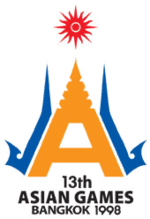 | |
| Host city | Bangkok, Thailand |
|---|---|
| Motto | Friendship Beyond Frontiers (Thai: มิตรภาพไร้พรมแดน) Mitrp̣hāph rị̂ phrmdæn |
| Nations participating | 41 |
| Athletes participating | 6,554 (4,454 men, 2,100 women) |
| Events | 377 in 36 sports |
| Opening ceremony | 6 December |
| Closing ceremony | 20 December |
| Officially opened by | Bhumibol Adulyadej King of Thailand |
| Officially closed by | Ahmad Al-Fahad Al-Sabah President of the Olympic Council of Asia |
| Athlete's Oath | Preeda Chulamonthol |
| Judge's Oath | Songsak Charoenpong |
| Torch lighter | Somluck Kamsing |
| Main venue | Rajamangala National Stadium |
| Website | 1998 Asian Games |
| Part of a series on |
|
Bangkok was awarded the right on September 26, 1990, defeating Taipei, Chinese Taipei and Jakarta, Indonesia to host the Games. It was the first city to hosted the Asian Games for four times, the last three editions it hosted were in 1966, 1970 and 1978. The event was opened by Bhumibol Adulyadej, the king of Thailand at the Rajamangala Stadium.[1]
The final medal tally was led by China, followed by South Korea, Japan and the host Thailand. Thailand set a new record with 24 gold medals. In addition, Japanese Athletics Koji Ito was announced as the most valuable player (MVP) of the Games. The games were deemed generally successful with the rising standard of competition amongst the Asian nations. For Thailand, it was one of its remarkable achievement in sports development throughout its modern history.
Bidding process
Three cities bid for the Games. All three, Taipei (Chinese Taipei), Jakarta (Indonesia) and Bangkok (Thailand) submitted their formal bid in 1989.
The vote was held on September 27, 1990, at the China Palace Tower Hotel in Beijing, China, during the 9th Olympic Council of Asia (OCA) General Assembly. All 37 members voted, with voting held in secret ballot. It was announced that Bangkok won the rights. Though the vote results were not released, it was revealed that Bangkok won by 20-10-7.
After that, Bangkok was the first city to hosted the Asian Games for four times, after the 1966, 1970 and 1978 games and this was the first time that the city have put a bid for the event.[2][3]
19 votes were needed for selection.
| 1998 Asian Games bidding result | ||||||
|---|---|---|---|---|---|---|
| City | Country | Votes | ||||
| Bangkok | 20 | |||||
| Taipei | 10 | |||||
| Jakarta | 7 | |||||
Development and preparation
Costs
According to United Press International news report, preparations for the games including the construction and renovation of three main stadiums and an athletes' village, cost an estimated 6 billion Thai baht (US$167 million).
Venues
- Hua Mark
- Rajmangala Stadium (Opening & Closing ceremonies, Football)
- Indoor Stadium (Sepak Takraw)
- Velodrome (Cycling track)
- Shooting Range (Shooting)
- Clay Target Shooting Range (Clay Target Shooting)
- Muang Thong Thani
- IMPACT Arena (Boxing)
- IMPACT Hall 1-5 (Billiards & Snooker, Gymnastics, Volleyball)
- Thunder Dome (Weightlifting)
- SCG Stadium (Rugby, Football)
- Tennis Centre (Tennis)
- Thammasat University (Rangsit Centre)
- Main Stadium (Athletics and Football)
- Gymnasium 1 (Basketball, Judo, Wrestling)
- Gymnasium 2 (Badminton)
- Gymnasium 3 (Handball)
- Gymnasium 4 (Fencing)
- Gymnasium 5 (Table Tennis)
- Gymnasium 6 (Wushu)
- Gymnasium 7 (Karate, Taekwondo)
- Tennis Court (Soft Tennis)
- Field 1 (Archery)
- Field 2 (Softball)
- Aquatic Center (Aquatics)
- Athletes Village
- Other venues
- Bangkok and Phra Nakhon Si Ayutthaya
- Kasetsart University (Hockey)
- PS Bowling Bangkapi (Bowling)
- Suphachalasai Stadium (Football)
- Thai Army Sports Stadium (Rugby)
- Thai-Japanese Stadium (Football)
- Thupatemee Stadium (Football)
- 700th Anniversary Stadium (Football)
- Ambassador Sport Center (Squash)
- Ao-Dongtarn Jomtien Beach (Sailing)
- Jomtian beach (Beach Volleyball)
- Map Prachan Reservoir (Canoeing, Rowing)
- Srinakharinwirot University (Ongkarak Campus) (Handball, Softball, Kabaddi)
- Khao Yai Rimtarn Resort (Cycling Mountain bike)
- Phahonyothin Road -(Cycling Road)
- Nakhon Sawan Province Central Stadium (Football)
- Alpine Golf and Sports Club (Golf)
- Queen Siritkit Sport Complex (Baseball, Hockey)
- Fort Adhisorn Riding Club (Equestrian)
- Sisaket Province Central Stadium (Football)
- Suwannawong Gymnasium Hat Yai (Sepak Takraw)
- Tinasulanon Stadium (Football)
- Suphan Buri
- Municipal Gymnasium (Basketball)
- Suphan Buri Province Central Stadium (Football)
- Surat Thani Province Central Stadium (Football)
- Trang Province Central Stadium (Football)
- Municipal Gymnasium (Sepak Takraw)
Marketing
Emblem

The Official Emblem of the 13th Asian Games elements from Asia in general and Thailand in particular. It is based on the letter A, representing Asia and Athletes. The Maha Chedi, or pagoda shape, represents Thailand, in particular. The pinnacle of the Maha Chedi symbolises the knowledge, intelligence and athletic prowess of Thailand's forefathers, which are second to none. The top is part of the OCA logo.[6]
Mascot
The official Mascot of the 13th Asian Games is an elephant named Chai-Yo (Thai: ไชโย) (a Thai word meaning pleasure, gladness, success, unity and happiness) whose name is a phrase shouted by a group of people to show their unity and solidarity. In Thailand, the elephant is a very distinctive animal which has lived with its people for many generations and is universally admired for its strengths and nobility.[7][8]
The games
Opening ceremony
The opening ceremony started at 17:00 local time on December 6, 1998. It was attended by King of Thailand, Bhumibol Adulyadej, President of the International Olympic Committee Juan Antonio Samaranch and President of the OCA Sheikh Ahmed Al-Fahad Al-Ahmed Al-Sabah. The nations entered in alphabetic order of their country names in Thai during the parade of nations.
Participating Nations
National Olympic Committees (NOCs) are named according to their official IOC designations and arranged according to their official IOC country codes in 1998.
| Participating National Olympic Committees |
|---|
|
![]()
Sports
- Aquatics
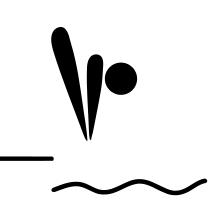



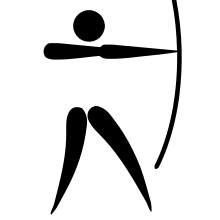

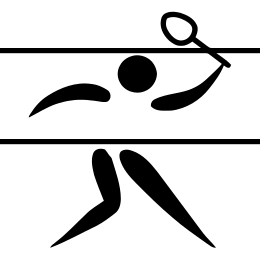
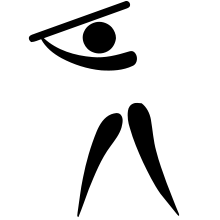



_pictogram.svg.png)

_pictogram.svg.png)
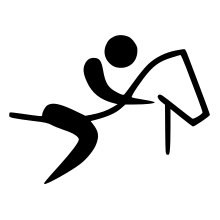



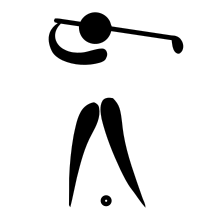
_pictogram.svg.png)








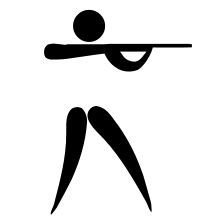






- Volleyball
_pictogram.svg.png)
_pictogram.svg.png)



Demonstration


Medal table
The top ten ranked NOCs at these Games are listed below. The host nation, Thailand, is highlighted.
* Host nation (Thailand)
| Rank | Nation | Gold | Silver | Bronze | Total |
|---|---|---|---|---|---|
| 1 | 129 | 78 | 67 | 274 | |
| 2 | 65 | 46 | 53 | 164 | |
| 3 | 52 | 61 | 68 | 181 | |
| 4 | 24 | 26 | 40 | 90 | |
| 5 | 24 | 24 | 30 | 78 | |
| 6 | 19 | 17 | 41 | 77 | |
| 7 | 10 | 11 | 13 | 34 | |
| 8 | 7 | 14 | 12 | 33 | |
| 9 | 7 | 11 | 17 | 35 | |
| 10 | 6 | 22 | 12 | 40 | |
| 11–33 | Remaining | 35 | 70 | 114 | 219 |
| Totals (33 nations) | 378 | 380 | 467 | 1225 | |
See also
References
- Thailand's King Lights Asian Games Flames
- "Bangkok to host 1998 Asian games". United Press International. 27 September 1990.
- "What an Imperfect Time To Rethink Games Funding".
- "Sadec Asiad 1998 venues". Archived from the original on 2014-12-20. Retrieved 2017-10-17.
- "Thailand's King Bhumibol Adulyadej ('BOOM-ee-pon Ah-doon-ya-det') formally opened the..." upi.com. 6 December 1998.
- "Emblem (Official website)". Archived from the original on 1998-01-15. Retrieved 2019-02-22.
- "13th Asian Games Bangkok 1998 - Chai-Yo". GAGOC. gz2010.cn (official website of 2010 Asian Games). April 27, 2008. Archived from the original on October 28, 2011. Retrieved May 26, 2011.
- "Mascot (Official Website)". Archived from the original on 1998-01-15. Retrieved 2019-02-22.
- "part 8 Opening Ceremony Asian Game 1998(bangkok)". YouTube.
External links
- 1998 Asian Games Official Website
- 1998 Asian Games result system
- Sadec 1998 Asian Games Site
- Kompas Indonesia Games Coverage site
- Asian Games Language Selection Site
| Preceded by Hiroshima |
Asian Games Bangkok XIII Asian Games (1998) |
Succeeded by Busan |
